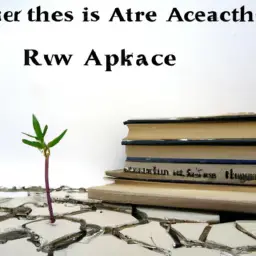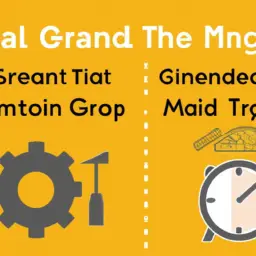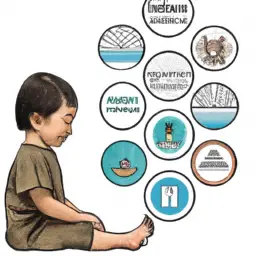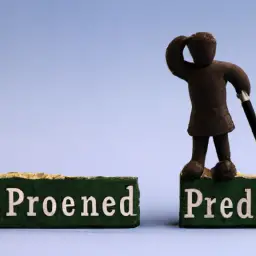When it comes to achieving success, you need more than just talent or intelligence. It takes a lot of hard work, perseverance, and resilience to reach your goals. That’s where grit comes in.
Grit is a quality that allows you to stay focused and motivated, even when faced with adversity. But is grit enough? What about emotional intelligence? Can it help you succeed as well? In this article, we will explore the relationship between grit and emotional intelligence, their pros and cons, and which one is more important for success. So, let’s dive in and find out.
Grit is often seen as a key ingredient for success. It refers to the ability to stick to your goals and overcome obstacles, even in the face of challenges and setbacks. It’s about having the passion and perseverance to pursue your dreams, no matter what.
But grit is not just about being tough and persistent. It also involves having a growth mindset, being open to learning and feedback, and having a sense of purpose and meaning in what you do. In short, grit is a combination of determination, resilience, and self-discipline, which can help you achieve your goals and reach your full potential.
Key Takeaways
- Grit and emotional intelligence are both important for success and have practical applications in personal and professional settings.
- Developing emotional intelligence leads to better communication and relationships, while grit can lead to resilience and bouncing back from setbacks.
- Balancing grit and emotional intelligence is necessary for success, and both qualities require understanding and regulating one’s own emotions.
- Cultural values impact the development of grit, and emotional intelligence can sometimes cloud judgment.
Understanding the Definition and Importance of Grit
Don’t underestimate the power of grit – it’s the tenacity and determination that propels individuals towards success. Building grit through adversity is essential for individuals who wish to achieve their goals.
It’s the ability to persevere through tough times, overcome obstacles, and continue to strive towards success. Without grit, individuals may give up easily, and their dreams and aspirations may never come to fruition.
Cultivating perseverance and resilience is necessary for building grit. Individuals who possess grit can maintain focus and stay motivated, even when faced with setbacks.
They understand that failure is part of the process, and they use it as an opportunity to learn and grow. Building grit takes time and effort, but it’s a skill that can be developed through practice and determination.
Those who possess grit are more likely to achieve their goals and thrive in their personal and professional lives.
Understanding the Definition and Importance of Emotional Intelligence
You’ll be pleased to know that understanding emotional intelligence is key to achieving your goals and thriving in both personal and professional settings.
Emotional intelligence can be defined as the ability to recognize, understand, and manage one’s own emotions, as well as recognize, understand, and influence the emotions of others.
There are two main components to emotional intelligence: personal competence and social competence.
Personal competence refers to the ability to understand and regulate one’s own emotions. This includes self-awareness, which is the ability to recognize and understand one’s own emotions, and emotional regulation, which is the ability to manage and control those emotions.
Social competence, on the other hand, refers to the ability to understand and interact with others. This includes empathy, which is the ability to understand and share the emotions of others, and social skills, which are the abilities to communicate effectively, build relationships, and resolve conflicts.
Developing emotional intelligence can lead to better communication, stronger relationships, and ultimately, greater success.
The Relationship Between Grit and Emotional Intelligence
If you want to succeed, it’s important to understand how grit and emotional intelligence are related in the workplace. While grit is often seen as the ability to persevere and push through challenges, emotional intelligence (EQ) is the ability to understand and manage one’s own emotions, as well as the emotions of others. Both qualities are important for success, but they work together in different ways.
Grit and EQ are complementary skills. In order to succeed, you need to be able to persevere through challenges and setbacks, while also being able to manage your emotions and effectively communicate with others. Developing both grit and EQ together can help you build a strong foundation for success in the workplace.
Grit can help you develop emotional intelligence. When you have the ability to persevere through challenges, you may also develop a greater sense of self-awareness and emotional control. This can help you better understand and manage your own emotions, as well as the emotions of others.
Emotional intelligence can help you develop grit. When you understand and manage your own emotions effectively, you may be better equipped to handle setbacks and challenges in a constructive way. This can help you develop the resilience and perseverance needed to succeed in the long term.
Both grit and emotional intelligence are important for success in the workplace. By developing these skills together, you can build a strong foundation for success and achieve your goals.
The Pros and Cons of Grit
You might be wondering about the advantages and disadvantages of having a tenacious attitude towards achieving your goals. On one hand, grit can help you push through obstacles and setbacks, enabling you to stay focused on your objectives. It can also help you develop resilience, which is the ability to bounce back from adversity and keep going despite challenges. This can be particularly valuable in the face of long-term goals that require sustained effort and commitment.
However, there are also some potential downsides to grit. For example, if you become too focused on a particular goal, you may miss out on other opportunities or fail to see the bigger picture. Additionally, grit can sometimes lead to burnout or exhaustion, particularly if you don’t take time to rest and recover. Finally, the impact of culture on grit development is important to consider. Some cultures may value perseverance and tenacity more than others, which can affect how individuals approach their goals and the level of support they receive from their community.
| Pros | Cons |
|---|---|
| Helps you push through obstacles | Can lead to burnout or exhaustion |
| Develops resilience | May cause you to miss out on other opportunities |
| Valued in some cultures | Cultural impact on grit development |
The table above summarizes some of the main pros and cons of having a gritty attitude towards achieving your goals. While grit can be a valuable trait, it’s important to be aware of its potential downsides and to balance your determination with self-care and a broader perspective. Additionally, understanding how culture and social support can impact grit development can help you cultivate this trait in a way that’s consistent with your values and goals.
The Pros and Cons of Emotional Intelligence
Developing emotional intelligence can enhance your ability to understand and manage your own emotions, as well as empathize with others. This can lead to better communication, more effective teamwork, and increased job satisfaction in the workplace. By being aware of your own emotions and how they affect others, you can make better decisions and build stronger relationships with colleagues and clients.
However, it’s crucial to acknowledge the potential drawbacks of relying solely on emotional intelligence in decision-making and interpersonal interactions. Emotions can be unpredictable and sometimes cloud our judgment. It’s important to balance emotional intelligence with a strong work ethic and determination to achieve our goals. By combining both grit and emotional intelligence, we can become more resilient and successful in both our personal and professional lives.
To effectively develop emotional intelligence, it’s important to learn to identify and manage your emotions, practice active listening and empathy towards others, and utilize emotional intelligence to build better relationships at work. But it’s equally important to remember to rely on grit and determination to overcome obstacles and achieve success.
Which Is More Important for Success?
When it comes to achieving success, there is an ongoing debate regarding the importance of grit versus emotional intelligence.
While grit refers to perseverance and determination, emotional intelligence pertains to the ability to understand and manage one’s own emotions as well as those of others.
As you consider which quality is more important for success, it’s important to weigh the various factors involved and recognize the value of developing both grit and emotional intelligence.
The Debate Between Grit and Emotional Intelligence
Although the debate between grit and emotional intelligence is ongoing, it can be argued that both qualities are essential for success in various areas of life.
Grit refers to a person’s perseverance and determination to achieve long-term goals, while emotional intelligence pertains to one’s ability to understand and manage their emotions and those of others.
Both qualities have practical applications in personal and professional settings, and while some people may possess more of one quality than the other, both can be developed through practice and experience.
When it comes to the nature vs. nurture debate, it can be said that both grit and emotional intelligence are influenced by both factors.
Some people may be born with a natural inclination towards perseverance or emotional intelligence, but these qualities can also be developed through experiences and learning opportunities.
In terms of practical applications, grit can help individuals push through challenging situations and setbacks, while emotional intelligence can aid in effective communication and building strong relationships with others.
Ultimately, both qualities are important for success and can complement each other in various ways.
Factors to Consider When Determining Which Is More Important
You can’t deny that your ability to handle stress and emotions plays a huge role in achieving your goals, so it’s important to consider all the factors when determining what makes someone successful.
Both grit and emotional intelligence are important, but it really depends on how you measure success. For example, if you define success as achieving a specific goal, grit may be more important. This is because grit is all about perseverance and determination, which can help you push through challenging obstacles to reach your goals.
However, if you define success as having strong relationships and being able to work well with others, emotional intelligence may be more important. Real-life examples of successful people show that those with high emotional intelligence are often more effective leaders and have better interpersonal skills.
In the end, it’s important to find a balance between both grit and emotional intelligence, as both are essential for achieving success in different areas of life.
The Importance of Developing Both Qualities
Developing both qualities of grit and emotional intelligence is necessary for individuals to thrive and excel in all aspects of their lives.
While grit is essential in achieving long-term goals and overcoming obstacles, emotional intelligence is equally important in building strong relationships and navigating interpersonal dynamics.
Balancing grit and emotional intelligence requires a deep understanding of one’s own emotions, as well as the ability to regulate them in order to remain focused and motivated.
Practical application of grit and emotional intelligence in daily life can take many forms. For example, individuals can practice grit by setting achievable goals and persisting in the face of setbacks, while also practicing emotional intelligence by actively listening to others, communicating effectively, and showing empathy.
By developing both qualities, individuals can become more well-rounded, adaptable, and successful in their personal and professional lives. Ultimately, the key is to strike a balance between perseverance and emotional awareness, recognizing that both qualities are essential for achieving long-term success and fulfillment.
Frequently Asked Questions
How can someone develop grit and emotional intelligence?
Developing resilience and managing emotions are key components to success in all aspects of life. To develop resilience, start by setting realistic goals and working towards them consistently. When faced with setbacks, try to see them as opportunities for growth and learning, rather than failures.
It’s also important to cultivate a growth mindset, which means embracing challenges and seeing them as opportunities for improvement. To manage emotions, practice self-awareness by identifying your triggers and learning to regulate your responses. This can involve techniques like deep breathing, mindfulness, and reframing negative thoughts.
Additionally, seek support from others when needed and prioritize self-care activities like exercise, sleep, and spending time with loved ones. By developing these skills, you can become more resilient and emotionally intelligent, setting yourself up for success in all areas of your life.
Are there any specific careers or industries where grit or emotional intelligence are more important for success?
In industries that rely heavily on collaboration, such as healthcare, education, and technology, teamwork is often more important than leadership. This is because these industries require individuals to work together towards a common goal, and effective teamwork is essential for success.
However, the importance of grit and emotional intelligence can vary depending on one’s cultural background and career path. For example, in some cultures, grit may be highly valued and seen as a key factor in achieving success, while in others, emotional intelligence may be more important for building strong relationships and navigating complex social dynamics.
Ultimately, the key to success in any career is to develop a balance of both grit and emotional intelligence, and to continually work on improving these qualities throughout your professional journey.
Can someone have high levels of both grit and emotional intelligence, or are they mutually exclusive traits?
You may be wondering if it’s possible to have high levels of both grit and emotional intelligence. The answer is yes, these traits can coexist within an individual.
While grit may be more closely associated with achieving personal goals and success, emotional intelligence plays a crucial role in personal relationships. It allows you to understand and empathize with others, effectively communicate, and build strong connections.
While both traits have their own unique benefits, having a balance of both can lead to overall success in both personal and professional aspects of life.
Are there any negative consequences for someone who lacks grit or emotional intelligence in the workplace?
If you lack grit or emotional intelligence in the workplace, it can have negative implications on the team dynamic.
Without grit, you may struggle to persevere through challenges and may give up easily, causing delays in projects and frustration among your colleagues.
Lacking emotional intelligence can also lead to interpersonal conflicts, as you may struggle to understand and communicate effectively with your team.
However, it’s important to note that both grit and emotional intelligence can be developed through self-awareness and intentional practice.
By recognizing areas where you may be lacking and working to improve them, you can become a valuable asset to your team and increase your chances of success in the workplace.
How can someone effectively balance the use of grit and emotional intelligence in their personal and professional lives?
When it comes to balancing grit and emotional intelligence in your personal and professional life, it’s important to understand that both are equally important and necessary.
Balancing Grit & EQ in Personal Relationships means being able to persevere through challenges while also empathizing with the feelings and needs of others.
Navigating Workplace Conflicts with Grit & Emotional Intelligence requires the ability to stand up for yourself and your beliefs, while also maintaining a level of emotional intelligence that allows for effective communication and conflict resolution.
Ultimately, finding the right balance between grit and emotional intelligence means being able to adapt to different situations and using both qualities when necessary.
Conclusion
So, which is more important for success: grit or emotional intelligence? The answer is not a simple one.
Both grit and emotional intelligence have their strengths and weaknesses, and both can be essential for achieving success in different areas of life.
If you’re looking to achieve success in a field that requires a lot of perseverance and determination, such as athletics or entrepreneurship, grit may be more important.
On the other hand, if you’re looking to succeed in a field that requires a lot of interpersonal skills, such as management or counseling, emotional intelligence may be more important.
Ultimately, the key to success is to develop both grit and emotional intelligence and to use them in the right situations to achieve your goals.















































































































